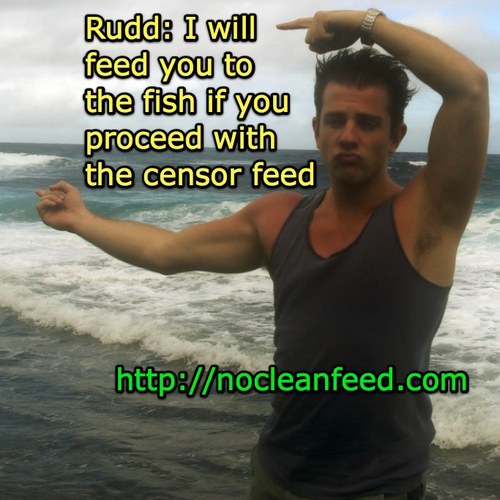 There is a cancer growing in our society. This problem may seem small, isolated and insignificant, but left unchecked, could grow to affect everyone in the world. Because when a small nation validates a disastrous idea, it gives the larger countries evidence to pursue it – and like domino’s, we all fall.
There is a cancer growing in our society. This problem may seem small, isolated and insignificant, but left unchecked, could grow to affect everyone in the world. Because when a small nation validates a disastrous idea, it gives the larger countries evidence to pursue it – and like domino’s, we all fall.
Logging into a Bogota internet cafe last year as I was backpacking around South America, I nearly choked. Australia’s new government had slightly tweaked their election commitment: they no longer wanted to help parents filter the Internet to prevent their children from stumbling on child porn (children don’t watch child porn, and lets not forget the fact that child pornographers have a sophisticated offline network that bypasses technology), but now the government was going to mandate a “clean” feed on everybody. Mandatory censorship on the Internet is not a future I want. It made my blood boil.
It was to be a filtration regime, that the government would censor whatever they thought was deemed censorable. An unaccountable, shady regime using the high moral ground of claiming to look after children, but in subsequent examinations, has proven to be just the start. A recent leak has shown that there has been considerable scope creep. Pornography, gambling, abortion websites – all the good stuff in life that make conservative Christian’s pray for a flood and famine to clean society up – would be part of this black list, despite being perfectly legal for adults. The question isn’t why is the government banning porn and the like; it’s where will the line be drawn and who determines that? We are seeing a moral crusade, cloaking a very real civil rights issue.
I wrote an email to every senator of the Australia government several months back, speaking on behalf of the Silicon Beach Australia community (which will give you all the background you need). Fortunately it worked – I not only educated, but I was acknowledged from two important senators that the current administration needed to pass the legislation. It was a temporary win, and thankfully since then the Australian mainstream media have taken an absolutely beating on the government. But very rarely does this get international attention.
More recent announcements suggest the legislation is dead in the water. But let’s not get complacent – we are only as safe as the next election, where the numbers in the Senate shift. This has been an issue for several years being pushed by the parties to win the growing Christian conservative vote. This dangerous policy hasn’t died – it’s just undergoing an evolution.
Why the rest of the world should care…and be scared
One thing that I’ve learned from this experience, is that the Australian government will cling onto the flimsiest of evidence and pathetic moral rhetoric, to position their case. Distorted perspectives, exaggerated linkages – it almost makes me laugh and then cry to see how desperate the government is to sell its case, by citing overseas efforts in an inaccurate way, in order to build their case. It is a propaganda war based on lies that we are getting sick of .
If an economically insignificant – but credible nation – like Australia introduces this filteration regime, it means it’s a global precedent. We don’t want a precedent. All it takes is one solid example, and governments around the world can jump out of hiding on this sensitive electoral issue.
The Internet needs to be open, free, and available. It’s going to be the infrastructure of our society that will allow new opportunities for the development of the human race. So when a government starts flirting with the idea of internet censorship – don’t get complacent. Every piece of legislation passed, is a step closer to a control regime we don’t need.
We need to make this issue political suicide around the world. Our public pressure needs to get to the point, where no politician in their right mind, will try to implement this policy. I’m not asking you to suddenly become an activist, but just understand – there is no room for leeway in this. This issue has been under-reported by the media across the world – let’s kill this cancer once and for all. Because unless we exterminate this fake moral crusade, this cancer is going to slowly grow in the background – only for us to realise it’s all over when it’s too late.
It’s not often I will breakout in anger over this, but I think about it everyday (like how my Twitter avatar is in constant protest). No need to chain yourself to a tree – but let’s start making this the bigger deal that it really is.













